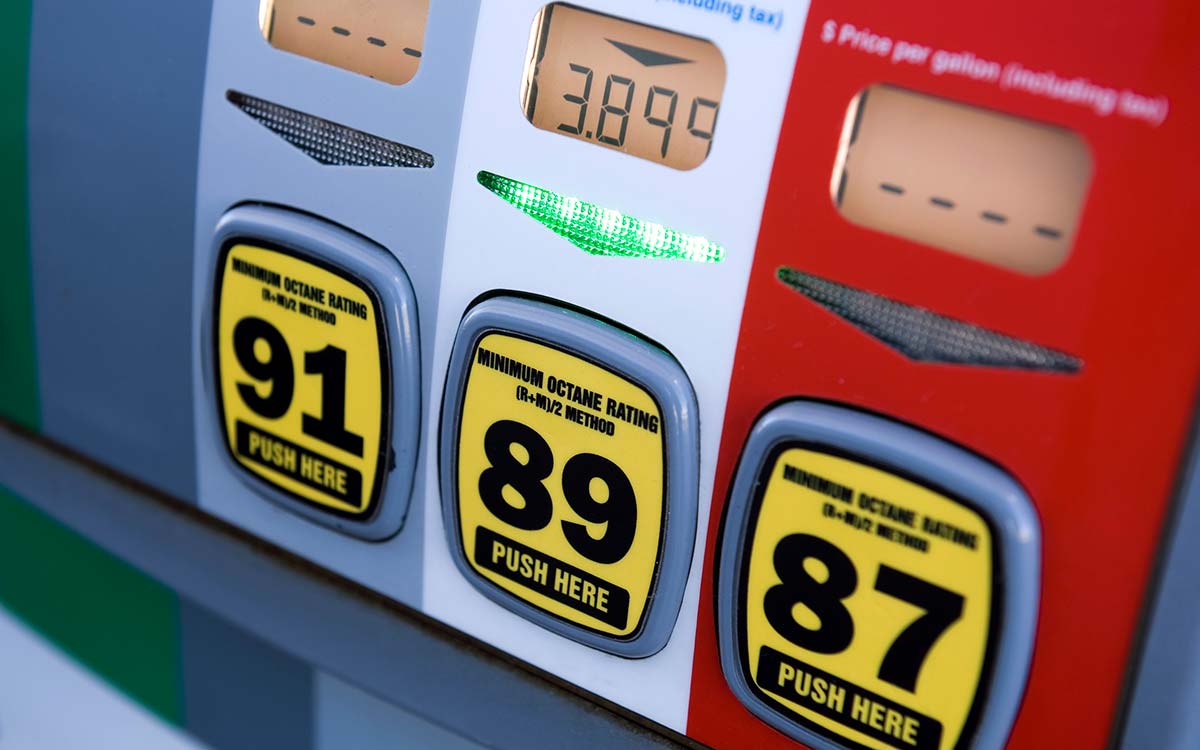Get this deal! Call now.
Speak with a vehicle protection plan specialist and get $300 off any new contract instantly.
Call 866-678-4172
or scan the code below


Your vehicle is one of the biggest investments you will make throughout your lifetime. Protecting this investment is key to getting the most from your car and ensuring that it lasts for years to come.
Of course, one of the best ways to help your vehicle stay running properly for longer is with preventative maintenance. But did you know that using the correct gasoline is one of the best (and easiest) ways to keep your vehicle running smoothly?
While even brand new drivers or those who don’t drive know a car needs gas to run, many still don’t exactly know why this is needed. To put it simply, your car needs gas to fuel the engine to allow the vehicle to operate.
The fuel system in your car moves gas from the gas tank, through the fuel lines, and up to the fuel injectors to help with combustion. Combustion occurs when the fuel in your engine is sparked by your spark plugs, hence their name. This combustion pushes the pistons down and keeps your engine in motion. Without gas, your engine will not have what it needs to operate correctly, leaving you with a dead vehicle.
Hybrid vehicles, such as the Toyota Prius, can run on both gasoline and electricity, unlike electric vehicles (EVs), such as the Nissan LEAF.
Not all vehicles are created the same, so some may take different types of gas to help them run as efficiently as possible. For example, some vehicles may require a lower octane rating, while others, such as those with high-performance engines, may require a different type of fuel altogether.
One of the most popular gasoline alternatives is the diesel engine. Diesel engines are more commonly seen in trucks and larger vehicles, though some standard vehicles also require diesel fuel, which burns differently than gasoline. If you are unfamiliar with the type of gas your vehicle needs, check your owner’s manual for the automaker’s recommendation.
Whether your vehicle uses gasoline or diesel fuel, it’s essential to protect it and yourself from unexpected and costly repair bills. While auto insurance or mechanical breakdown insurance can all help with some types of damages or repairs, they won’t cover everything. That’s where an extended warranty (also known as a vehicle service contract or VSC) comes in. With a protection plan from Endurance, you can rest easy knowing your car, truck or SUV is covered for many of the issues a typical insurance contract won’t cover, including coverage for your vehicle’s most components. You can also get even more peace of mind with 24/7 roadside assistance, which comes standard with the purchase of any Endurance plan.

Gasoline, sometimes also referred to as petrol, is the most common fuel for car engines. Unleaded gasoline, which is made without any lead additives thanks to the Clean Air Act, has a faster ignition than diesel and is more readily available, making it perfect for passenger vehicles.
To work, gasoline, which is measured in octane levels, utilizes your car’s spark plugs to create the necessary “spark” needed to help your engine run. Most passenger vehicles use regular 87 octane gas for normal operation, but some high-performance vehicles may require what is known as “premium” gasoline. This premium fuel is a more stable form of gasoline that helps vehicles run more efficiently, though not all vehicles will require this type of fuel. Overall, gasoline is usually offered with three different octane grades: regular gasoline (87 octane), mid-grade gasoline (89 octane) and premium gasoline (91-94 octane).
Diesel fuel is becoming more common in passenger vehicles and trucks as fuel technology progresses. Diesel is commonly used on engines with turbochargers as it helps to create more power at a lower RPM (rotations per minute) within the vehicle’s engine, making them ideal for towing and hauling. Diesel fuel also produces less carbon monoxide than unleaded gasoline, but it will often have higher levels of soot and nitrogen compounds, which are byproducts of the overall combustion process. This is why you might see black smoke coming from diesel trucks compared to the lighter gray tones you see with vehicles using regular, mid-grade or premium gasoline. Another significant difference between gasoline and diesel fuel is that diesel engines will not utilize spark plugs for ignition, unlike gasoline engines. Instead, diesel vehicles use glow plugs and compression to create the ignition needed to get the vehicle running.
Some examples of diesel-powered vehicles include:
A newer type of fuel, biodiesel, is derived from vegetable oils, animal fats, or even recycled grease from restaurants. Similar to diesel fuel, biodiesel is used to fuel compression-ignition engines. Biodiesel is also renewable, clean-burning and is being used to help reduce the US dependence on imported diesel. While there are not many biodiesel vehicles on the road compared to gasoline and diesel, the biodiesel industry is paving the way for a cleaner-burning fuel alternative. It can help cut overall emissions by up to 80% compared to gasoline-powered engines and 74% lower emissions compared to diesel fuels. In fact, most of the diesel fuel found in gas stations across the country contains about 5% biodiesel.
Ethanol is another new fuel type that has become very popular with both car manufacturers and the aftermarket car industry. Ethanol is a renewable fuel made from corn and other plant materials. The most common blend of Ethanol is E10 which is 10% ethanol and 90% gasoline. If your vehicle is “flex-fuel,” you can use E85, a higher-level ethanol blend with 51% to 83% ethanol. These vehicles can use both E85 and gasoline to power the vehicle.
The type of gas you use in your engine will dictate how well your car operates. By using the right fuel type, you can ensure that your engine will run smoothly, help to prevent engine damage and maximize fuel economy. If you use the wrong type of gasoline in your engine, you can experience a few different symptoms. You can also void your extended warranty or vehicle service contract if you use the incorrect gas.
If your vehicle calls for a lower octane rating and you fill up with a higher octane rating, you will most likely not experience any symptoms or damage to your car’s engine. However, if your vehicle requires a higher octane fuel and you use a lower octane fuel, you could experience engine knocking or pinging. This could lead to further engine damage if not corrected.
Using the wrong fuel type, such as diesel in a gas engine, can cause catastrophic damage if not caught soon enough. If you happen to fill up with the wrong type of fuel and have not started the vehicle, you can have it towed to a certified auto repair shop or ASE Certified mechanic to have it pumped before it can damage or destroy any engine components.
Overall, the compression ratio for each type of vehicle is different and will require different fuel types. Higher compression engines usually require high-octane fuel for maximum engine performance, fuel efficiency and proper engine operation. Before filling up your new car, check your owner’s manual or fuel gas cap for an octane number and match this up to the octane gasoline number on the fuel pump.
While using the correct gas in your car is vital to keeping your car running smoothly and maximizing fuel economy, it’s not the only thing you must do. In addition to using the correct fuel, keeping up with your car’s maintenance schedule is crucial to help your car last for years to come.
With an auto protection plan such as Advantage, you can rest easy when it comes to maintaining your vehicle with up to $3,500 in maintenance benefits. These include essential services such as tire rotations, up to 3 oil and filter changes, engine diagnostic exams and more. Each Advantage plan also comes with several other special, one-time services such as cooling system maintenance and a battery replacement, among others — giving you even more coverage and savings.
Every Endurance protection plan also comes with 24/7 roadside assistance and access to a full year’s worth of Elite Benefits. These benefits, which you can activate for just a small fee, include perks such as key fob replacements, total loss protection (up to $1,000), collision discounts (up to $500 per collision with a $1,000 limit) and even up to two replaced or repaired tires.
To learn more about how you can find an Endurance protection plan that fits your needs and budget, request a free quote or give us a call directly at 800-253-8203. Be sure to visit our Learning Center, where you can find even more articles on topics such as DIY maintenance tips, vehicle buying guides and answers to many of the extended warranty FAQs you may have.

We're here to make sure you get the most comprehensive EV protection. That's why we've partnered with Xcelerate Auto to offer you transparent and dependable Tesla coverage.
Want us to contact you about XCare coverage for your Tesla?



Call for $300 off any new plan!
By clicking the button, you consent to Endurance using automated technology to call, email, and text you using the contact info above, including your wireless number, if provided, regarding auto protection or, in California, mechanical breakdown insurance. You also agree to the Endurance Privacy Policy and Terms and Conditions. Consent is not a condition of purchase, and you can withdraw consent at any time. Message and data rates may apply.
Speak with a vehicle protection plan specialist and get $300 off any new contract instantly.
Call 866-678-4172
or scan the code below



Simply fill out the information below and we will follow up fast with your free no-obligation quote.
By clicking the button, you consent to Endurance using automated technology to call, email, and text you using the contact info above, including your wireless number, if provided, regarding auto protection or, in California, mechanical breakdown insurance. You also agree to the Endurance Privacy Policy and Terms and Conditions. Consent is not a condition of purchase, and you can withdraw consent at any time. Message and data rates may apply.

To speak to a vehicle protection plan specialist and save $300
Scan the code below
As both an Army Veteran & ASE Certified repair shop owner, Andrew has made educating the modern driver an ongoing mission since the opening of his repair shop, Midwest City Autospa, in 2012. Read more about Andrew.